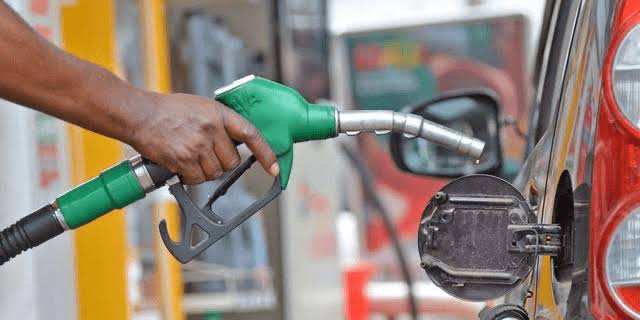Breaking News
Petrol Consumption Drops 28% as Stations Record Low Patronage, Attendants Idle
President Bola Tinubu had, in his May 29, 2023 inauguration speech, declared that “subsidy is gone,” ending decades of costly payments that drained tens of trillions of naira. The Nigerian National Petroleum Company (NNPC) Limited immediately reviewed petrol prices upward, raising pump rates from N195 to N448 in Lagos, and from N197 to N557 in Abuja. Within a month, prices spiked further to N617 per litre.

Nigeria’s daily petrol consumption has plunged by 28 per cent in two years, leaving many pump attendants at filling stations idle as motorists cut back on fuel purchases.
Data from the Nigerian Midstream and Downstream Petroleum Regulatory Authority (NMDPRA) revealed that consumption of Premium Motor Spirit (PMS) dropped from 68.35 million litres in June 2023, when subsidy removal took effect, to 49.27 million litres in June 2025.
President Bola Tinubu had, in his May 29, 2023 inauguration speech, declared that “subsidy is gone,” ending decades of costly payments that drained tens of trillions of naira. The Nigerian National Petroleum Company (NNPC) Limited immediately reviewed petrol prices upward, raising pump rates from N195 to N448 in Lagos, and from N197 to N557 in Abuja. Within a month, prices spiked further to N617 per litre.
Since then, with the commissioning of the Dangote Refinery, marketers have repeatedly adjusted pump prices, sometimes weekly.
Low Sales, Idle Pumps
At several stations nationwide, attendants lamented dwindling patronage, noting that many Nigerians now buy fuel only when necessary due to rising living costs.
Station Manager at RYBL Services Limited in Karshi, Abuja, Ibrahim Gambo, said sales have slowed drastically:
“The market is not moving well. We used to have three pump attendants, but now we keep only one. It takes about two months to sell a single 30,000-litre tanker. Before, people came with jerry cans, but now you hardly see that. People buy only when they must, and even generators are used sparingly.”
Similar scenes were observed in Lagos, with stations at Amuwo-Odofin, Apapa, Ajegunle, and Orile reporting low turnover. An attendant at Techno Oil, Alaba Oro, said:
“Within the last two weeks, the price of petrol increased by N50 and dropped N20 a few days ago. But business is not lucrative. Before deregulation, customers filled up their tanks, but now demand is very low.”
However, retail outlets such as MRS and Fatgbems in Amuwo and Oshodi/Apapa expressway bucked the trend, drawing long queues due to slightly lower pump prices. At MRS, prices fell to N865 per litre, compared to N870–N890 elsewhere.
“We are very grateful for the number of customers and the turnover we are getting. I can tell you that things have turned around for us at MRS,” said Chinenye, an MRS attendant.
Similar patterns were reported in Delta, Nasarawa, Kano, and Kaduna, where independent stations saw low traffic, while outlets tied to major networks like MRS, AA Rano, and AYM Shafa attracted more vehicles due to cheaper prices.
In Kano, a pump attendant at Ammasco lamented:
“You can’t compare sales two years ago with now. The increase in pump price is the major factor. Sales have dropped drastically.”
CNG Demand Rising
While petrol sales slump, demand for Compressed Natural Gas (CNG) has surged, with long queues recorded at outlets in Abuja and other cities. Prices range between N230 and N235 per kilogram, far cheaper than petrol.
Bolt driver Onyebuchi Okeke explained why he prefers CNG:
“I don’t mind the wait because it’s far cheaper. I fill my 10kg cylinder for N2,300 and make over N10,000 from it in about four hours. I hardly buy petrol anymore since converting my car.”
Marketers Struggle
The Public Relations Officer of the Independent Petroleum Marketers Association of Nigeria (IPMAN), Chief Chinedu Ukadike, admitted that the drop in consumption has hurt businesses.
“This is a trying time for independent marketers. Many only sell one truck in one or two months. CNG conversions, higher prices, and subsidy removal have reduced demand. If this continues, independent marketers may go extinct by 2028.”
He added that smuggling of petrol to neighbouring countries has also reduced drastically since Nigeria’s prices are no longer cheaper than across the borders.
Price Instability a Risk – Expert
Energy consultant Henry Adigun, CEO of AHA Consultancies, warned that frequent price fluctuations in the downstream sector are discouraging investment.
“The downstream market must be competitive, fair, and well regulated. Frequent changes cause heavy losses for marketers and affect their ability to repay bank loans. Dangote Refinery is a state-of-the-art facility, but government must allow importation to maintain competition and prevent monopoly.”









